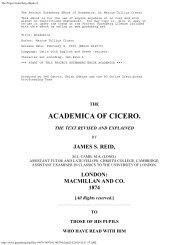From Farm House to the White House - 912 Freedom Library
From Farm House to the White House - 912 Freedom Library
From Farm House to the White House - 912 Freedom Library
Create successful ePaper yourself
Turn your PDF publications into a flip-book with our unique Google optimized e-Paper software.
<strong>Farm</strong> <strong>House</strong> <strong>to</strong> <strong>the</strong> <strong>White</strong> <strong>House</strong>, by William M. Thayer 199<br />
"I receive my friend with a cordial welcome," answered Washing<strong>to</strong>n. "He is welcome <strong>to</strong> my house and<br />
welcome <strong>to</strong> my heart; but, with all his good qualities, he is not a man of business. His opponent is, with all his<br />
political hostility <strong>to</strong> me, a man of business. My private feelings have nothing <strong>to</strong> do with this case. I am not<br />
George Washing<strong>to</strong>n, but President of <strong>the</strong> United States; as George Washing<strong>to</strong>n, I would do this man any<br />
kindness in my power; but as President of <strong>the</strong> United States, I can do nothing."<br />
In 1793 Washing<strong>to</strong>n was deeply affected by <strong>the</strong> news of Lafayette's exile and incarceration in Germany. He<br />
<strong>to</strong>ok measures at once <strong>to</strong> secure his release, if possible, and sent him a thousand guineas. Lafayette's son, who<br />
was named after <strong>the</strong> American general, George Washing<strong>to</strong>n Lafayette, came <strong>to</strong> this country, accompanied by<br />
his tu<strong>to</strong>r, when his fa<strong>the</strong>r was driven in<strong>to</strong> exile. After <strong>the</strong> close of Washing<strong>to</strong>n's public life, young Lafayette<br />
became a member of his family at Mount Vernon. His fa<strong>the</strong>r was not liberated until 1797.<br />
The following maxims, gleaned from his prolific writings, disclose <strong>the</strong> principles which governed his actions<br />
in public life, and at <strong>the</strong> same time <strong>the</strong>y magnify his ability as a writer. When we reflect that his schooldays<br />
embraced instruction only in reading, writing, and arithmetic, <strong>to</strong> which he added surveying later, <strong>the</strong> clearness<br />
and elegance of his style become a matter of surprise. His epis<strong>to</strong>lary correspondence is a model <strong>to</strong> all who<br />
would attain excellence in <strong>the</strong> art; and his grasp of thought and practical view of government and science, are<br />
unsurpassed by any statesman. Of <strong>the</strong> large number of notable extracts we might collect from his writings, we<br />
have space for a few only, as follows:<br />
"Our political system may be compared <strong>to</strong> <strong>the</strong> mechanism of a clock, and we should derive a lesson from it;<br />
for it answers no good purpose <strong>to</strong> keep <strong>the</strong> smaller wheels in order if <strong>the</strong> greater one, which is <strong>the</strong> support and<br />
prime mover of <strong>the</strong> whole, is neglected."<br />
"Common danger brought <strong>the</strong> States in<strong>to</strong> confederacy; and on <strong>the</strong>ir union our safety and importance depend."<br />
"Remember that actions, and not <strong>the</strong> commission, make <strong>the</strong> officer. More is expected from him than <strong>the</strong> title."<br />
"Knowledge is, in every country, <strong>the</strong> surest basis of public happiness."<br />
"True friendship is a plant of slow growth, and must undergo and withstand <strong>the</strong> shocks of adversity before it is<br />
entitled <strong>to</strong> <strong>the</strong> appellation."<br />
"To share <strong>the</strong> common lot, and participate in conveniences which <strong>the</strong> army, from <strong>the</strong> peculiarity of our<br />
circumstances, are obliged <strong>to</strong> undergo, has with me, been a fundamental principle."<br />
"The value of liberty is enhanced by <strong>the</strong> difficulty of its attainment, and <strong>the</strong> worth of character appreciated by<br />
<strong>the</strong> trial of adversity."<br />
"It is our duty <strong>to</strong> make <strong>the</strong> best of our misfortunes, and not suffer passion <strong>to</strong> interfere with our interest and <strong>the</strong><br />
public good."<br />
"In my estimation, more permanent and genuine happiness is <strong>to</strong> be found in <strong>the</strong> sequestered walks of<br />
connubial life than in <strong>the</strong> giddy rounds of promiscuous pleasure, or <strong>the</strong> more tumultuous and imposing scenes<br />
of successful ambition."<br />
"Without virtue and without integrity, <strong>the</strong> finest talents and <strong>the</strong> most brilliant accomplishments can never gain<br />
<strong>the</strong> respect and conciliate <strong>the</strong> esteem of <strong>the</strong> truly valuable part of mankind."<br />
"Few men have virtue <strong>to</strong> withstand <strong>the</strong> highest bidder."<br />
"A good moral character is <strong>the</strong> first essential in a man. It is, <strong>the</strong>refore, highly important <strong>to</strong> endeavor not only















